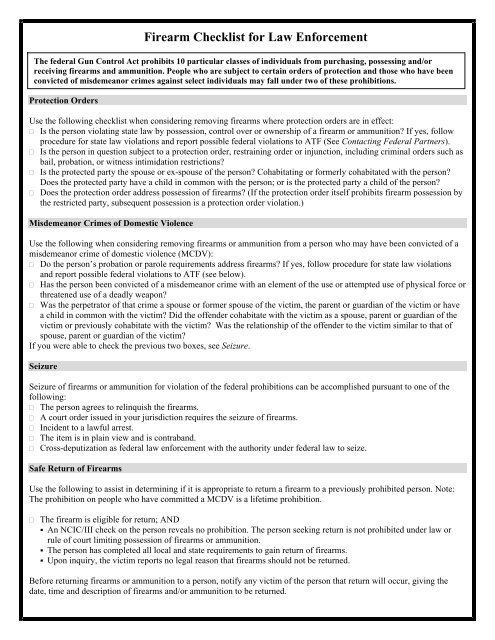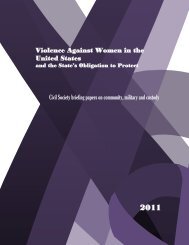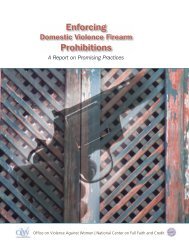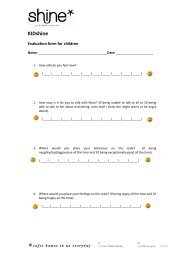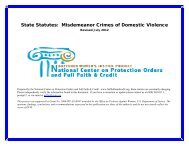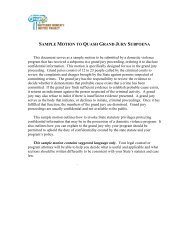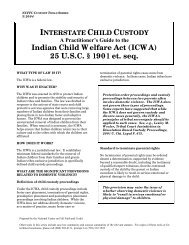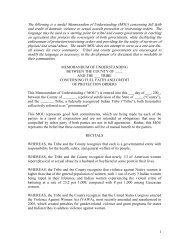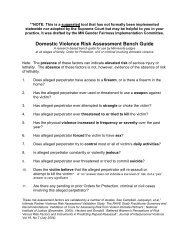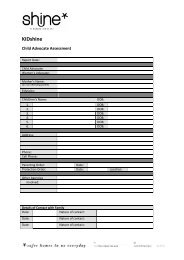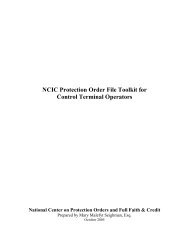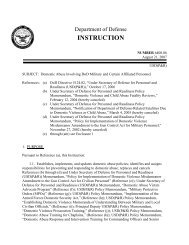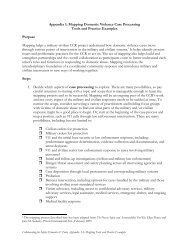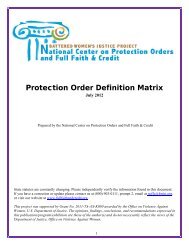Firearm Checklist for Law Enforcement - Battered Women's Justice ...
Firearm Checklist for Law Enforcement - Battered Women's Justice ...
Firearm Checklist for Law Enforcement - Battered Women's Justice ...
Create successful ePaper yourself
Turn your PDF publications into a flip-book with our unique Google optimized e-Paper software.
Protection Orders<br />
<strong>Firearm</strong> <strong>Checklist</strong> <strong>for</strong> <strong>Law</strong> En<strong>for</strong>cement<br />
The federal Gun Control Act prohibits 10 particular classes of individuals from purchasing, possessing and/or<br />
receiving firearms and ammunition. People who are subject to certain orders of protection and those who have been<br />
convicted of misdemeanor crimes against select individuals may fall under two of these prohibitions.<br />
Use the following checklist when considering removing firearms where protection orders are in effect:<br />
Is the person violating state law by possession, control over or ownership of a firearm or ammunition? If yes, follow<br />
procedure <strong>for</strong> state law violations and report possible federal violations to ATF (See Contacting Federal Partners).<br />
Is the person in question subject to a protection order, restraining order or injunction, including criminal orders such as<br />
bail, probation, or witness intimidation restrictions?<br />
Is the protected party the spouse or ex-spouse of the person? Cohabitating or <strong>for</strong>merly cohabitated with the person?<br />
Does the protected party have a child in common with the person; or is the protected party a child of the person?<br />
Does the protection order address possession of firearms? (If the protection order itself prohibits firearm possession by<br />
the restricted party, subsequent possession is a protection order violation.)<br />
Misdemeanor Crimes of Domestic Violence<br />
Use the following when considering removing firearms or ammunition from a person who may have been convicted of a<br />
misdemeanor crime of domestic violence (MCDV):<br />
Do the person’s probation or parole requirements address firearms? If yes, follow procedure <strong>for</strong> state law violations<br />
and report possible federal violations to ATF (see below).<br />
Has the person been convicted of a misdemeanor crime with an element of the use or attempted use of physical <strong>for</strong>ce or<br />
threatened use of a deadly weapon?<br />
Was the perpetrator of that crime a spouse or <strong>for</strong>mer spouse of the victim, the parent or guardian of the victim or have<br />
a child in common with the victim? Did the offender cohabitate with the victim as a spouse, parent or guardian of the<br />
victim or previously cohabitate with the victim? Was the relationship of the offender to the victim similar to that of<br />
spouse, parent or guardian of the victim?<br />
If you were able to check the previous two boxes, see Seizure.<br />
Seizure<br />
Seizure of firearms or ammunition <strong>for</strong> violation of the federal prohibitions can be accomplished pursuant to one of the<br />
following:<br />
The person agrees to relinquish the firearms.<br />
A court order issued in your jurisdiction requires the seizure of firearms.<br />
Incident to a lawful arrest.<br />
The item is in plain view and is contraband.<br />
Cross-deputization as federal law en<strong>for</strong>cement with the authority under federal law to seize.<br />
Safe Return of <strong>Firearm</strong>s<br />
Use the following to assist in determining if it is appropriate to return a firearm to a previously prohibited person. Note:<br />
The prohibition on people who have committed a MCDV is a lifetime prohibition.<br />
The firearm is eligible <strong>for</strong> return; AND<br />
• An NCIC/III check on the person reveals no prohibition. The person seeking return is not prohibited under law or<br />
rule of court limiting possession of firearms or ammunition.<br />
• The person has completed all local and state requirements to gain return of firearms.<br />
• Upon inquiry, the victim reports no legal reason that firearms should not be returned.<br />
Be<strong>for</strong>e returning firearms or ammunition to a person, notify any victim of the person that return will occur, giving the<br />
date, time and description of firearms and/or ammunition to be returned.
Protocol <strong>for</strong> Officer Involved Domestic Violence<br />
There is a limited exemption from the firearm prohibition while subject to a qualifying protection order. The person must<br />
be:<br />
Certain federal, state, or local government employee (seek ATF guidance as to who qualifies); or<br />
Member of the Armed Forces; or<br />
<strong>Law</strong> en<strong>for</strong>cement officer;<br />
AND<br />
The firearm must be a duty weapon that is necessary <strong>for</strong> employment. (This exemption is <strong>for</strong> duty firearms only and is<br />
not applicable to any other firearms.); AND<br />
The prohibited person meets all local and employment-based requirements to maintain possession.<br />
Note: The official use exemption is not available to tribal law en<strong>for</strong>cement officers subject to a qualifying protection<br />
order unless those officers are cross-deputized by a Federal, state or local law en<strong>for</strong>cement agency and operating on behalf<br />
of that agency. There is no exemption <strong>for</strong> people who have been convicted of MCDVs, regardless of their employment.<br />
Responding to Judicial and Federal Request <strong>for</strong> In<strong>for</strong>mation<br />
The promptness with which you respond can save a life.<br />
Offer detailed in<strong>for</strong>mation on any protection order or conviction <strong>for</strong> a MCDV or felony.<br />
Provide in<strong>for</strong>mation on the relationship between the victim and the abuser.<br />
Provide in<strong>for</strong>mation on the possession, control or ownership of firearms and permits.<br />
Cooperate with requests <strong>for</strong> in<strong>for</strong>mation from other law en<strong>for</strong>cement agencies, the FBI and the ATF.<br />
Refer Situation to Federal <strong>Law</strong> En<strong>for</strong>cement<br />
Contact your ATF Field Office promptly if you suspect a Gun Control Act violation.<br />
Provide detailed in<strong>for</strong>mation on the protection order or conviction.<br />
Provide the protection order or record of conviction to ATF counsel or Field Office representative.<br />
Turn over seized firearms within 30 days to federal law en<strong>for</strong>cement.<br />
Cooperate with any ongoing federal investigation.<br />
National Center on Protection Orders and Full Faith & Credit<br />
(800) 903-0111 prompt 2<br />
NCFFC@bwjp.org<br />
www.fullfaithandcredit.org<br />
This project was supported by Grant No. 2006-WT-AX-KO47 awarded by the Office on Violence Against Women, U.S. Department of <strong>Justice</strong>. The<br />
opinions, findings, conclusions, and recommendations expressed in this publication/program/exhibition are those of the author(s) and do not<br />
necessarily reflect the views of the Department of <strong>Justice</strong>, Office on Violence Against Women.


